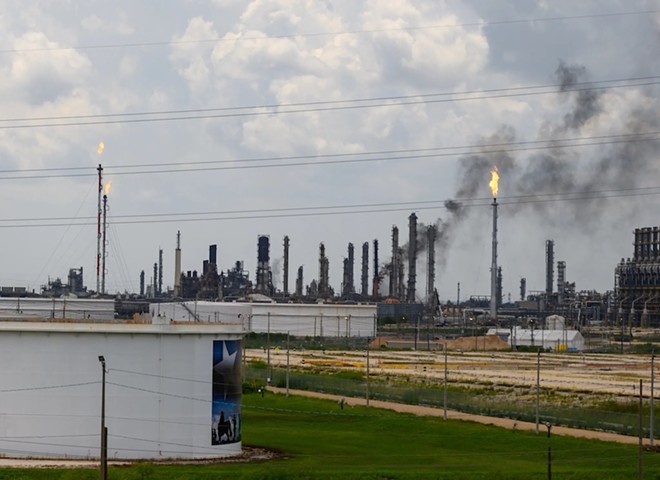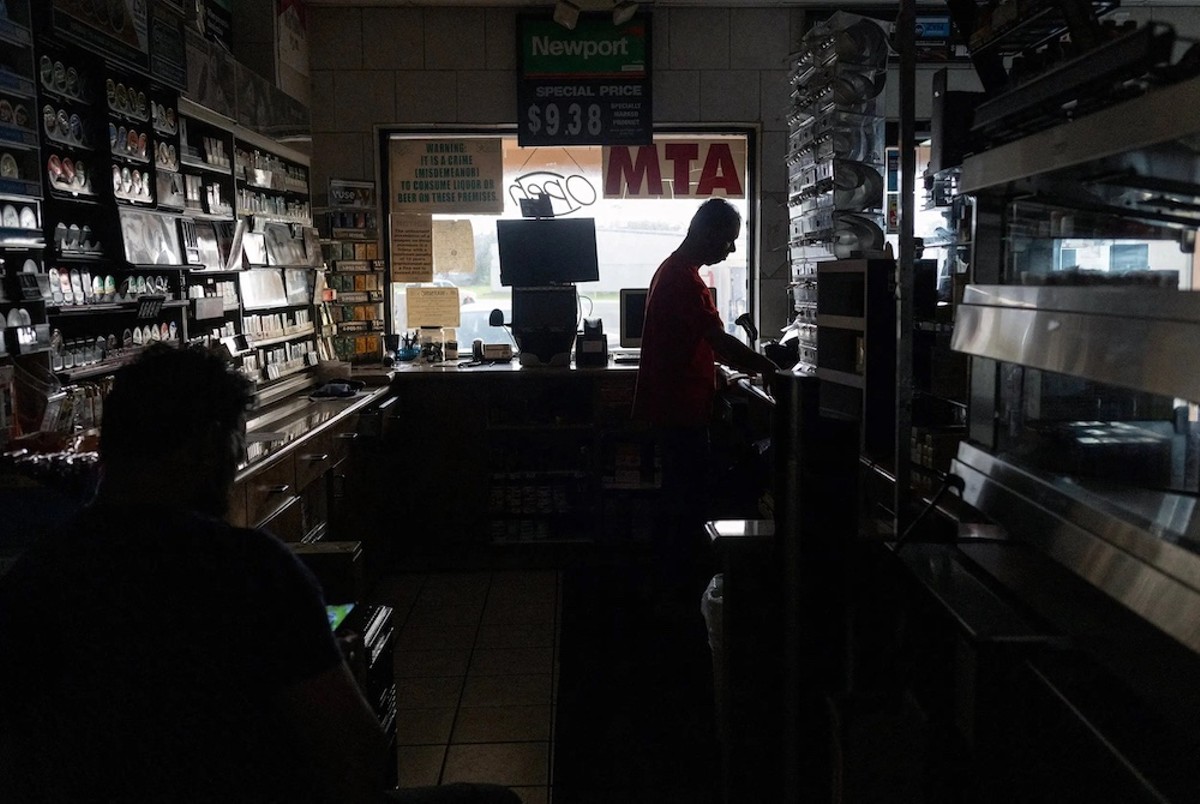
Shutterstock / michelmond
A 2019 fireplace on the Exxon Mobil chemical plant in Baytown, Texas, injured dozens of staff. Over the objections of environmentalists, the plant is in search of permission to develop, a dispute prone to wind up within the new fifteenth Court docket of Appeals.
Editor’s Observe: This story, co-published right here with permission, was produced by Public Well being Watch, a nonprofit investigative information group.
The announcement final month from Texas Gov. Greg Abbott was straightforward to miss. The governor, all the time keen to advertise what he calls his “conservative, business-friendly agenda,” had appointed three fellow Republicans to the brand new fifteenth Court docket of Appeals, created by the Texas Legislature final yr to resolve civil circumstances introduced by or towards the state, together with high-stakes enterprise litigation.
“These extremely skilled people will serve a significant position in our state’s effort to make sure that the Texas Structure and state statutes are utilized uniformly all through Texas and that companies have a complicated and environment friendly course of to resolve their disputes,” Abbott mentioned in a information launch.
These phrases sound pretty benign, however Texas environmental leaders see an ulterior motive: a maneuver that enables industries and state regulators to bypass the third Court docket of Appeals, whose six justices are, in the meanwhile, all Democrats.
The third Court docket’s justices are elected by residents of 24 Central Texas counties. Probably the most populous is Travis County, which incorporates progressive-leaning Austin.
The third Court docket historically has heard circumstances involving the Texas Fee on Environmental High quality (TCEQ), the state’s foremost enforcer of anti-pollution legal guidelines, and the Texas Railroad Fee, which, regardless of its title, regulates the oil and fuel business. Amongst different issues, the court docket hears challenges to permits issued — or denied — to industries by the TCEQ. These permits stipulate how a lot of a pollutant an organization can legally discharge into the air or water.
The fifteenth Court docket, which finally may have 5 justices elected statewide in deeply purple Texas, will soak up such circumstances from the third Court docket on September 1.
“It is a method for Texas to create a really conservative court docket that I think the governor believes shall be much less pleasant to environmental pursuits and doubtless very pleasant to enterprise,” mentioned Ilan Levin, an Austin-based senior counsel with the Environmental Integrity Venture, a analysis and advocacy group. “The appropriate wing doesn’t like the truth that you’ve obtained a fairly blue space of the state that’s electing this [3rd] appellate court docket that each one the TCEQ’s, Railroad Fee’s and different businesses’ administrative regulation circumstances run by.”
The third Court docket has been receptive to environmentalists’ arguments. In 2022, for instance, it sided with a district court docket that had ordered the TCEQ to launch inner company paperwork on the carcinogen ethylene oxide sought by the Sierra Membership. Because the membership described it in a weblog publish, the TCEQ wished to permit extra emissions of the chemical “by claiming [ethylene oxide] was 3,500x much less harmful than the federal Environmental Safety Company has proven. Sierra Membership requested TCEQ to publicly launch the paperwork that TCEQ thought of or relied on because the technical foundation for its [ethylene oxide] threat worth. However, the company refused, claiming confidentiality.”
Caleb Roberts, govt director of Downwinders at Danger, a Dallas-based clean-air advocacy group, mentioned the Legislature’s creation of the fifteenth Court docket additional sophisticated “an already advanced and arduous system” that favors polluters and their supporters on the state degree, on the expense of native authorities officers who “aren’t on the identical political spectrum.”
Texas’ Republican majority has labored for years to restrict the capability of jurisdictions like Harris County, a petrochemical-manufacturing powerhouse, to carry power polluters accountable. Simply final yr, the Legislature took away the rights of metropolis governments to guard staff from the life-threatening results of maximum warmth.
Among the many important TCEQ allowing circumstances that can go from the third Court docket to the fifteenth Court docket in September are proposed expansions of the Exxon Mobil chemical plant in Baytown, close to Houston, which skilled a significant accident in 2019, and the Valero refinery in Corpus Christi. The Exxon Mobil allow is on the TCEQ’s July 17 agenda and is predicted to be accredited; if that occurs, residents of the already-polluted neighborhood are prone to enchantment. The Valero allow was accredited by the TCEQ in June, towards the advice of an administrative regulation decide, and can also be prone to be appealed if the company doesn’t reverse its resolution.
One other case of observe: An enchantment of a Travis County decide’s order putting down the TCEQ’s so-called one-mile rule, which holds that anybody who lives farther than a mile from an industrial facility can’t contest a allow. Inside Local weather Information reported final yr that the TCEQ “has constantly invoked the [rule] to disclaim allow hearings for no less than the previous 13 years, despite the fact that no such rule exists in both Texas regulation or TCEQ guidelines.” The case in litigation includes the proposed enlargement of the Seahawk oil terminal by an organization known as Max Midstream on Lavaca Bay, southwest of Houston.
State Senator Joan Huffman, a Republican and a sponsor of the laws that created the fifteenth Court docket, advised Public Well being Watch that the brand new physique “will enable judges to use specialised precedent in topic areas essential to your entire state. As a result of these are problems with statewide concern, judges chosen statewide must be deciding them, and they need to be consultants in a lot of these circumstances.”
Abbott’s preliminary appointees are Scott A. Brister, a former justice on the all-Republican Texas Supreme Court docket whose 9 members reliably rule in favor of enterprise; Scott Ok. Discipline, a decide in Williamson County, north of Travis County, who misplaced his seat on the third Court docket to a Democrat in 2022; and April L. Farris, a justice on the first Court docket of Appeals in Houston and a former president of the native chapter of the Federalist Society, a conservative authorized group. Their phrases expire on the finish of 2026, and there are two extra gubernatorial appointees to return. Finally, all 5 justices shall be elected.
Along with fielding circumstances involving state businesses, the fifteenth Court docket will hear business disputes by which the quantity at stake exceeds $5 million in some cases and $10 million in others. Ought to an enchantment make it past the fifteenth Court docket, it can land within the state Supreme Court docket.
The political make-up of the third Court docket has modified dramatically since 2018, when there have been six Republican and no Democratic justices. By 2019, there have been 4 Democrats and two Republicans, and by final yr all of the justices have been Democrats. The fifteenth Court docket will tilt the steadiness of energy again to the Republicans.
Adrian Shelley, Texas director of the patron group Public Citizen, known as the brand new court docket a “slanted enjoying discipline the pro-corporation Legislature invented, with referees appointed by Governor Abbott. This takes judge-shopping to a brand new degree. It’s BYOC — convey your personal court docket — for polluters and highly effective pursuits.”
Abbott’s workplace didn’t reply to a request for remark by Public Well being Watch. Spokespeople for the TCEQ and the Texas Chemistry Council, a foyer group that represents the state’s chemical business, declined to remark.
Jim Morris is editor-in-chief of Public Well being Watch, a nonprofit investigative information group. Leah Clark and Manuela Silva are fellows with the Investigative Reporting Workshop at American College.
Subscribe to SA Present newsletters.
Comply with us: Apple Information | Google Information | NewsBreak | Reddit | Instagram | Fb | Twitter| Or join our RSS Feed





